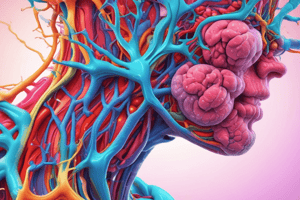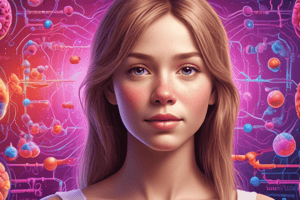Podcast
Questions and Answers
What is the role of hormones in the body?
What is the role of hormones in the body?
- Fight off infections
- Regulate blood oxygen levels
- Control the activity of endocrine glands (correct)
- Break down food into energy
Which gland is known as the 'master gland'?
Which gland is known as the 'master gland'?
- Adrenal gland
- Pituitary gland (correct)
- Parathyroid gland
- Thyroid gland
During adolescence, which gland plays a key role in regulating metabolism, growth, and development?
During adolescence, which gland plays a key role in regulating metabolism, growth, and development?
- Thyroid gland (correct)
- Pancreas
- Pituitary gland
- Adrenal gland
What is the function of parathyroid glands?
What is the function of parathyroid glands?
Which statement best describes the relationship between hormones and puberty?
Which statement best describes the relationship between hormones and puberty?
What distinguishes endocrine glands from exocrine glands?
What distinguishes endocrine glands from exocrine glands?
Which gland produces hormones such as cortisol, adrenaline, and aldosterone?
Which gland produces hormones such as cortisol, adrenaline, and aldosterone?
What is the primary function of the islet cells in the pancreas?
What is the primary function of the islet cells in the pancreas?
Which hormone stimulates growth in bones and other tissues in response to growth hormone?
Which hormone stimulates growth in bones and other tissues in response to growth hormone?
What is the primary function of sex hormones such as estrogen, progesterone, and testosterone?
What is the primary function of sex hormones such as estrogen, progesterone, and testosterone?
During puberty, what axis is activated leading to the secretion of sex hormones?
During puberty, what axis is activated leading to the secretion of sex hormones?
Which type of glands secrete hormones directly into body cavities or ducts, not into the bloodstream?
Which type of glands secrete hormones directly into body cavities or ducts, not into the bloodstream?
Flashcards are hidden until you start studying
Study Notes
The Endocrine System and Adolescence: A Journey of Hormonal Changes
The endocrine system plays a pivotal role in shaping our physical, emotional, and cognitive development during adolescence. This period, characterized by a flurry of hormonal changes, is orchestrated by the interaction of glands and their secretions that regulate various aspects of our lives.
Hormones: Chemical Messengers
Hormones are chemical substances produced and released by the endocrine glands, which travel through the bloodstream and exert their effects on target cells and tissues by binding to specific receptors. Hormones are essential for maintaining homeostasis, growth and development, and regulating metabolism, sexual development, and reproduction.
Endocrine Glands
There are several endocrine glands that contribute to the hormonal landscape during adolescence. Some of the key glands are:
- Pituitary gland: A small, bean-shaped gland located at the base of the brain, the pituitary acts as the "master gland," controlling the activity of other endocrine glands.
- Thyroid gland: Located in the neck, the thyroid produces hormones that regulate metabolism, growth, and development.
- Parathyroid glands: Four tiny glands embedded in the thyroid, the parathyroids regulate calcium and phosphorus levels in the blood.
- Adrenal glands: Located above the kidneys, the adrenals produce hormones such as cortisol, adrenaline, and aldosterone to manage stress, regulate blood pressure, and support metabolism.
- Pancreas: Although primarily known for its exocrine function, the pancreas also contains islet cells that produce hormones such as insulin and glucagon to regulate blood sugar levels.
- Gonads: The ovaries in females and testes in males produce sex hormones such as estrogen, progesterone, and testosterone, which regulate sexual development and reproduction.
Hormonal Changes during Adolescence
Adolescence, a period spanning from puberty's onset around age 10 to 14, and into young adulthood, is characterized by a cascade of hormonal changes that promote growth, sexual maturation, and emotional development. The primary hormones involved in these changes are:
- Growth hormone (GH): Produced by the anterior pituitary gland, growth hormone promotes growth in bones, muscles, and other tissues.
- Insulin-like growth factor 1 (IGF-1): Produced in response to growth hormone, IGF-1 stimulates growth in bones and other tissues.
- Thyroid hormones: T3 and T4 produced by the thyroid gland regulate metabolism and growth.
- Sex hormones: Estrogen and progesterone in females, and testosterone in males, regulate sexual development and reproduction.
These hormones interact with each other, as well as with other hormones and growth factors, to ensure a coordinated and balanced developmental process.
Puberty
Puberty is the process by which adolescents physically mature and develop reproductive capabilities. It is characterized by the activation of the hypothalamic-pituitary-gonadal (HPG) axis, which culminates in the secretion of sex hormones. These hormones stimulate changes in the body, such as:
- The maturation of the reproductive organs and secondary sex characteristics, such as breast development in females and facial hair in males.
- The growth spurt and elongation of long bones.
- The development of body fat and muscle mass.
Exocrine Glands
While discussing the endocrine system, it is essential to clarify that exocrine glands are not a part of the endocrine system. Exocrine glands produce and secrete hormones directly into body cavities or ducts, as opposed to endocrine glands, which secrete their hormones directly into the bloodstream. Examples of exocrine glands include salivary glands, pancreas, and sweat glands.
To summarize, the endocrine system plays a fundamental role in shaping adolescence, with hormonal changes promoting growth, sexual maturation, and emotional development. The intricate interplay between the glands and their secretions ensures a coordinated and balanced developmental process. A full understanding of the endocrine system is essential for grasping the complexities of adolescence and the underlying biological processes that drive this time of life.
Studying That Suits You
Use AI to generate personalized quizzes and flashcards to suit your learning preferences.




